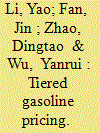|
|
|
Sort Order |
|
|
|
Items / Page
|
|
|
|
|
|
|
| Srl | Item |
| 1 |
ID:
111333


|
|
|
|
|
| Publication |
2012.
|
| Summary/Abstract |
Carbon Rationing Action Groups (CRAGs) are grassroots voluntary groups of citizens concerned about climate change, who set themselves a carbon allowance each year and provide support to members seeking to reduce their direct carbon emissions from household energy use and personal transport. Some groups have a financial penalty for carbon emitted in excess of the ration, and systems whereby under-emitters are rewarded using the monies collected from over-emitters. CRAGs therefore operate the nearest scheme in existence to the proposed policy of Personal Carbon Trading (PCT). This paper reports the findings of a study of the opinions and experiences of individuals involved in CRAGs ('CRAGgers'). In general, interviewees have made significant behavioural changes and emissions reductions, but many would be unwilling to sell spare carbon allowances within a national PCT system. The choices made by CRAGgers with respect to the design and operation of their 'carbon accounting', their experiences of reducing fossil fuel energy use, and their views on personal carbon trading at CRAG and national level are discussed. Some possible implications for PCT and other policies are considered, as well as the limitations of CRAGs in informing an understanding of the potential impacts and operation of PCT.
|
|
|
|
|
|
|
|
|
|
|
|
|
|
|
|
| 2 |
ID:
099285


|
|
|
|
|
| Publication |
2010.
|
| Summary/Abstract |
In 2008, the UK government undertook a review of personal carbon trading (PCT) and declared that it was 'an idea currently ahead of its time'. PCT is a radical policy proposal which would entail all adults receiving an equal, tradable carbon allowance to cover emissions from household energy and/or personal travel. The allowance would reduce over time, in line with national emissions reduction goals. The government's key concerns about PCT were its social unacceptability and high cost. This paper reviews the literature and identifies knowledge gaps, and then discusses whether these concerns are justified. Contrary to the government's conclusions, most research shows PCT to be at least as socially acceptable as an alternative taxation policy. People think it could be both fair and effective. Set-up and running costs for PCT will undoubtedly be higher than for alternative taxation policies. However, PCT could deliver benefits from individual and social change motivated by non-economic aspects of the policy. These potential benefits are outlined here. The conclusion is that PCT is a promising and timely policy idea.
|
|
|
|
|
|
|
|
|
|
|
|
|
|
|
|
| 3 |
ID:
183045


|
|
|
|
|
| Summary/Abstract |
Innovative policy instruments across the supply side (fossil fuel extraction), demand side (income and behaviour), and mediums of exchange (e.g.,. markets) can accelerate global decarbonization efforts in ways not yet supported by the global community. A fossil fuel non-proliferation treaty, a maximum wage and restrictions on wealth, and a carbon currency could radically alter how we extract, finance, and value fossil fuels and the changes in climate that result. In that vein, this article highlights the role of different and perhaps unacknowledged actors in accelerating decarbonization, notably those of new intergovernmental organizations, labor economists, central banks, insurers, accountants, and taxation specialists. It also discusses the benefits, and anticipated obstacles, to each policy innovation as well as what sorts of “systems transformation” they might achieve if implemented together.
|
|
|
|
|
|
|
|
|
|
|
|
|
|
|
|
| 4 |
ID:
150782


|
|
|
|
|
| Summary/Abstract |
This paper proffers a tiered gasoline pricing method from a personal carbon trading perspective. An optimization model of personal carbon trading is proposed, and then, an equilibrium carbon price is derived according to the market clearing condition. Based on the derived equilibrium carbon price, this paper proposes a calculation method of tiered gasoline pricing. Then, sensitivity analyses and consumers' surplus analyses are conducted. It can be shown that a rise in gasoline price or a more generous allowance allocation would incur a decrease in the equilibrium carbon price, making the first tiered price higher, but the second tiered price lower. It is further verified that the proposed tiered pricing method is progressive because it would relieve the pressure of the low-income groups who consume less gasoline while imposing a greater burden on the high-income groups who consume more gasoline. Based on these results, implications, limitations and suggestions for future studies are provided.
|
|
|
|
|
|
|
|
|
|
|
|
|
|
|
|
|
|
|
|
|